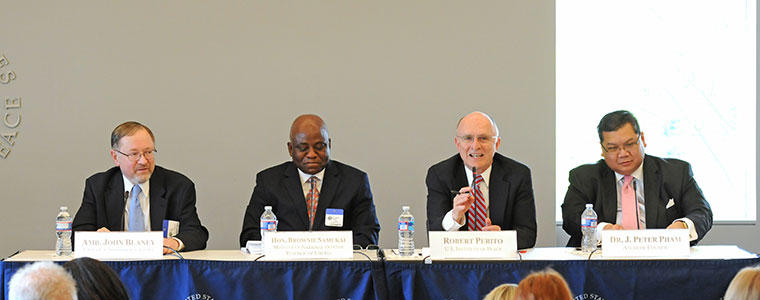The U.S. and international community are focused on the security transition in Afghanistan but must not ignore the major political and economic transition expected to occur over the next two years, according to a number of experts who spoke on two off-the-record panels at USIP last week.

It would be a "strategic misstep," said one panelist, if these agendas are ignored.
It was one of many issues panelists grappled with during the two discussions titled "From Transition to the Transformation Decade: Afghanistan’s Economic and Governance Agenda After Tokyo" and held July 18 at USIP [Peace Brief].
One panel focused on filling the fiscal gap and the $16 billion in pledges made by the U.S. and the international community at the Tokyo conference earlier this month. The second panel looked at filling the "trust gap" and what "mutual accountability" means in the context of the next several years between Afghanistan and donor nations.
Afghanistan and the international community emerged from the Tokyo conference with what many consider to be reliable, predictable promises of assistance, allaying fears that the international community will abandon the country after 2014.
But the ability of Afghanistan to absorb the $16 billion in pledges over the next four years is a major issue. One participant noted that the amount of money that Afghanistan needed was limitless, but the amount its government could actually absorb was even less than the $16 billion pledged over four years at Tokyo. In addition to aid, mining and agriculture will be the two main economic drivers in Afghanistan over the next several years. "Public investment should focus on these sectors," said one panelist.
Two or more panelists noted the humanitarian crisis that may arise from the departure of international forces over the next couple of years, with as many as 600,000 internally displaced people in Afghanistan now. "It’s a massive number of displaced people by any standard," said another panelist.
"The reality is that there has been so much focus on the security side… that the humanitarian side hasn’t received the focus," said another.
Many of the panelists agreed that there are positive trends across the country that, if nurtured, may take hold. But this good news was treated with some caution. "Those gains are fragile," one panelist concluded.
Watch Scott Smith, deputy director of USIP Afghanistan programs, assess the two schools of thought at the July 18 event:
\



